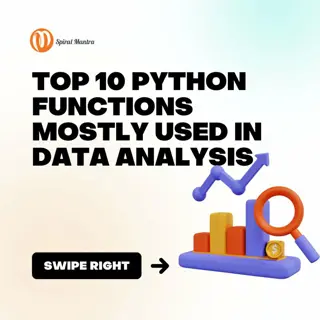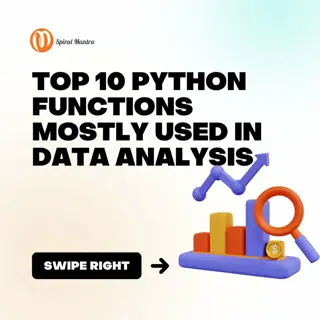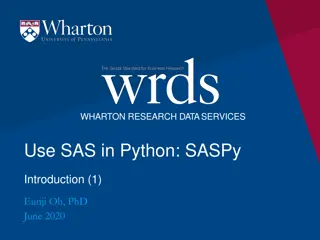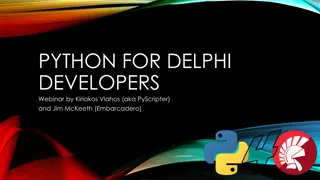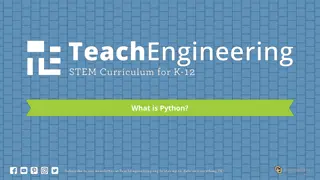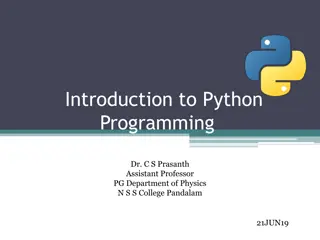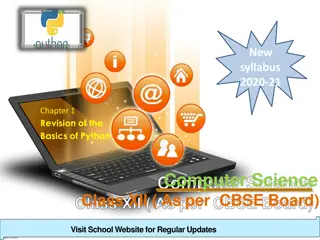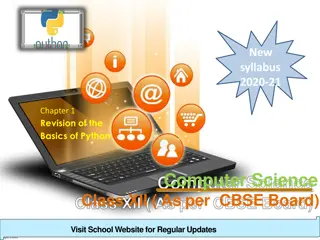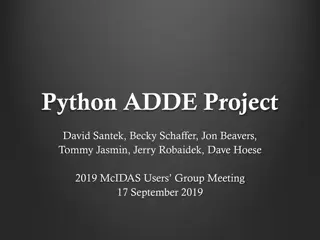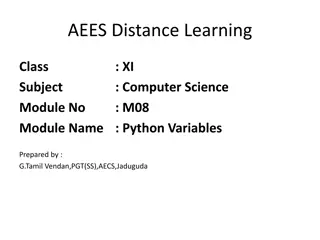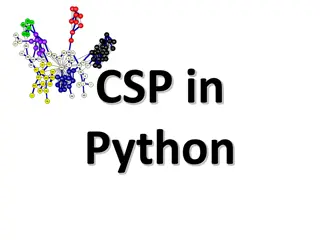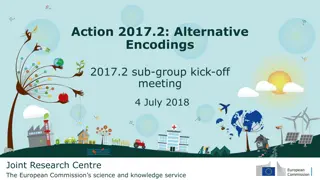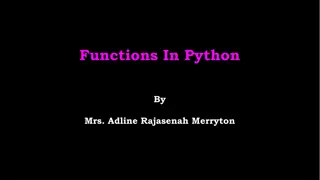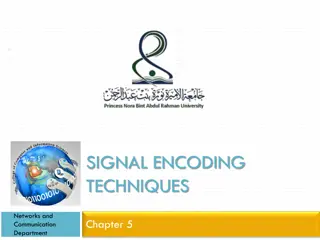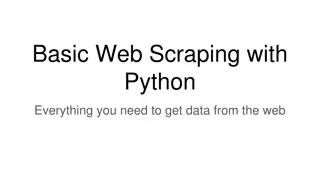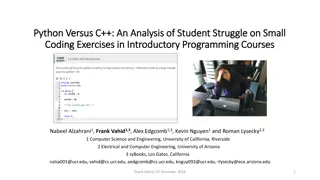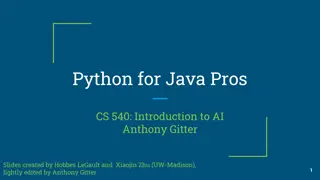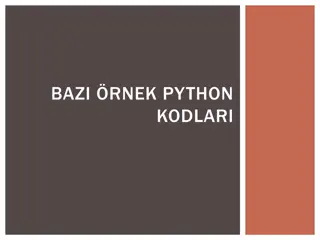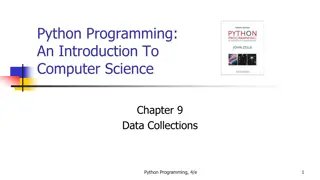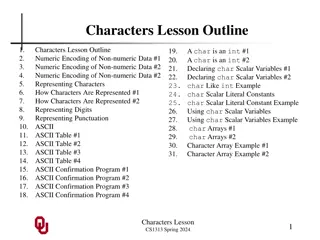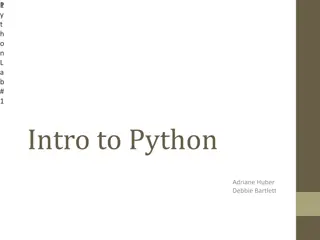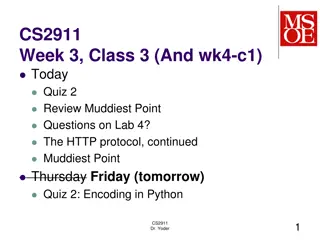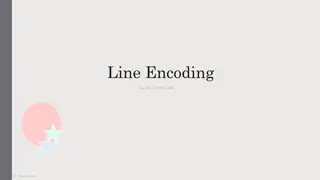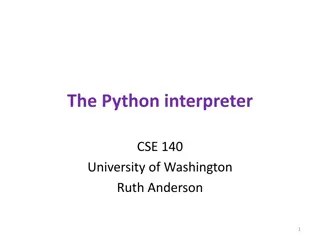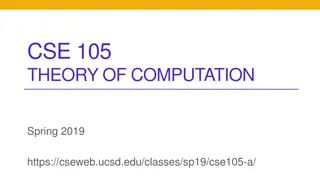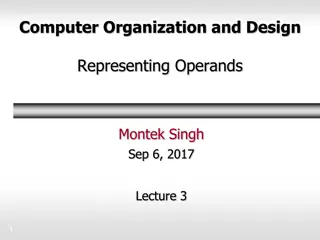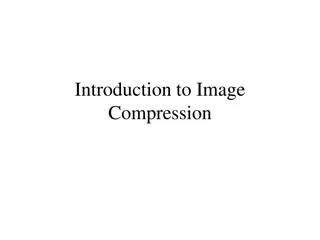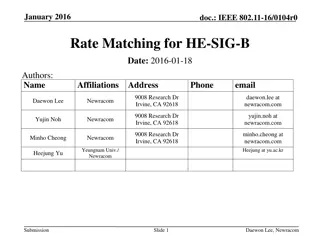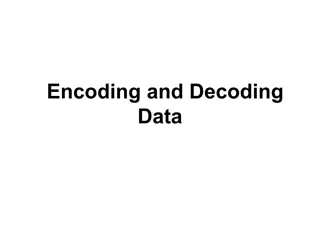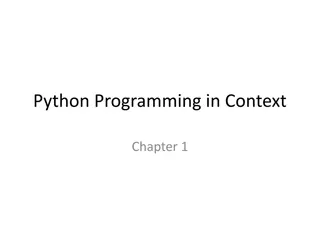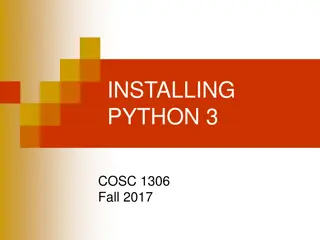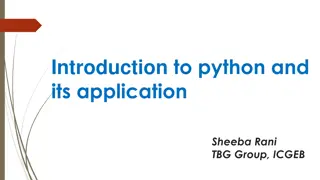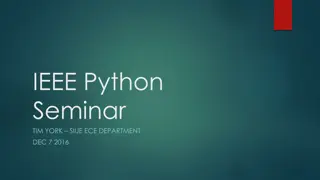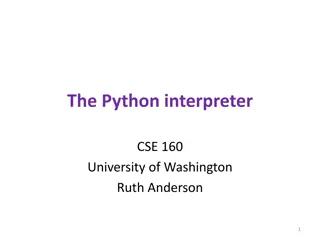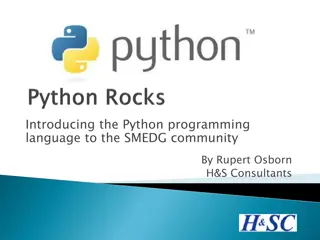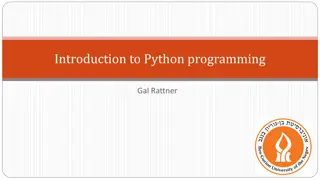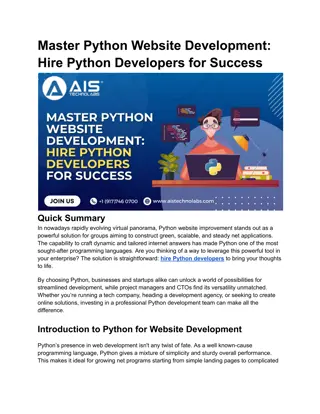Top 10 Python Functions
\nEmbark on a journey through Python's programming landscape with our curated selection of the \"Top 10 Python Functions.\" Dive into the versatility of these functions, from slicing and dicing strings to gracefully traversing complex data structures. Master Python's toolkit and revolutionize your c
5 views • 7 slides
Top 10 Python Functions
\nEmbark on a journey through Python's programming landscape with our curated selection of the \"Top 10 Python Functions.\" Dive into the versatility of these functions, from slicing and dicing strings to gracefully traversing complex data structures. Master Python's toolkit and revolutionize your c
2 views • 7 slides
Introduction to SASPy: Using SAS in Python
Learn about SASPy, a Python API to the SAS system that allows for seamless interaction between SAS and Python environments. Explore how to start a SAS session, exchange data between SAS datasets and Pandas data frames, and utilize various useful methods. Discover the benefits of incorporating SASPy
1 views • 11 slides
Python for Delphi Developers Webinar Overview
This webinar provides insights into the growing popularity of Python for Delphi developers. It showcases the potential synergies between Python and Delphi, highlighting the advantages and opportunities for developers in integrating these two languages. The session covers accessing Python libraries f
2 views • 23 slides
Understanding Python Programming Basics
Python is a popular high-level programming language known for its simple syntax, making it easy to learn and versatile for various applications. This introduction covers the basics of Python, including variables, objects, classes, and essential syntax rules like defining functions. Dive into the fun
2 views • 12 slides
Introduction to Python Programming at N.S.S. College: A Brief Overview
Python is a high-level programming language known for being open-source and community-driven. Developed by Guido van Rossum in the late 1980s, Python has evolved over the years to become a versatile language with a rich history. This overview touches upon Python's key features, timeline/history, and
1 views • 42 slides
Overview of Python Programming for Class XII Computer Science
This chapter provides a comprehensive revision of the basics of Python programming for Computer Science students in Class XII as per the CBSE Board syllabus. It covers the introduction, features, shortcomings, and practical aspects of working in Python, including interactive mode and script mode. Th
2 views • 61 slides
Basics of Python for Class XII Computer Science - CBSE Board
Comprehensive overview of Python programming language covering its introduction, features, shortcomings, and how to work in Python interactive and script mode. The content also emphasizes the importance of Python in software development, web development, system scripting, and mathematics alongside p
1 views • 61 slides
Revolutionizing Data Delivery with Python ADDE Project
Python ADDE Project aims to modernize data delivery infrastructure by developing Python libraries for ADDE server development, enabling easy creation of servers without the need for McIDAS-X knowledge. The initiative seeks to ensure a sustainable future for ADDE in serving new satellite and image da
3 views • 9 slides
Python Variables: Understanding Declaration, Naming Rules, and Assignment Operators
Python variables are essential for storing values in reserved memory locations. This article covers the basics of variables in Python, including declaration, assigning values, naming rules, multiple assignments, deleting variables, and assignment operators. Learn how to create, name, and manipulate
0 views • 11 slides
Understanding Object-Oriented Programming (OOP) in Python
Python is a versatile programming language that supports various programming approaches. Object-Oriented Programming (OOP) is a popular method in Python where objects are created to solve programming problems. OOP in Python focuses on creating reusable code, following the principle of DRY (Don't Rep
1 views • 35 slides
Solving CSP Problems in Python with python-constraint Package
Overview of how to install and use the python-constraint package for solving Constraint Satisfaction Problems (CSP) in Python. Includes installation instructions, simple examples, and applying constraints for solving problems like Magic Squares.
0 views • 21 slides
Alternative Encodings for GIS Systems - Action 2017.2 Report
Define alternative encoding rules for various application schemas in mainstream GIS systems. The report outlines the process of proposing and endorsing encoding rules, with a focus on GeoJSON, GML, database formats, and linked data. It also details tasks of developing specific encoding rules and enh
0 views • 11 slides
Understanding Functions in Python
Functions in Python can be built-in functions provided by Python or functions defined by the user. They enable code reusability by taking inputs, performing computations, and returning results. Function definition, arguments, max function, type conversions are key concepts explored in Python functio
0 views • 11 slides
Signal Encoding Techniques in Networks and Communication
This chapter delves into signal encoding techniques used in digital data transmission, covering key concepts such as encoding schemes like NRZ-L and NRZI, multilevel binary encoding, and biphase encoding. It explores the fundamentals of digital signaling, modulation techniques, and the relationship
3 views • 34 slides
Mastering Web Scraping with Python
Learn the essentials of web scraping using Python to extract data efficiently. Python's versatility shines in web programming and data management, allowing for a seamless research pipeline. Explore different approaches to web scraping in Python and understand the importance of managing data effectiv
9 views • 19 slides
Comparative Analysis of Student Struggle in Python vs. C++ for Small Coding Exercises
An analysis conducted by Nabeel Alzahrani, Frank Vahid, Alex Edgcomb, Kevin Nguyen, and Roman Lysecky compared student struggles in Python and C++ for small coding exercises in introductory programming courses. The study explored the ease of learning Python compared to C++ and the demand for Python
2 views • 17 slides
Introduction to Python for Java Professionals
Explore the transition from Java to Python with key differences, advantages of Python, suitable environments for coding, and a comparison of basic program structures between the two languages. Discover why Python is preferred for machine learning projects and where to write and run Python code onlin
1 views • 15 slides
Introduction to Basic Python Datatypes & Software Development
Explore the fundamental concepts of Python programming, including basic datatypes such as integers, floats, and booleans. Learn about software development, Python scripts, printing messages, user inputs, and more. Get started with Python using online IDEs like repl.it and delve into writing your fir
2 views • 29 slides
Python Coding Examples for Beginners
Explore various Python coding examples including calculating Fibonacci numbers, manipulating arrays, implementing Euclid's algorithm, finding prime numbers, and solving list difference problems. The examples cover a range of fundamental Python concepts and are accompanied by explanations to help beg
0 views • 18 slides
Introduction to Data Collections in Python Programming
In this introduction to computer science chapter, you will explore the use of lists, tuples, and dictionaries in Python to represent and manipulate collections of data. Learn about the functions and methods available for working with Python lists and understand how to group related values using tupl
0 views • 58 slides
Understanding Numeric and Character Encoding in Programming
In the world of programming, numeric encoding is used to represent non-numeric data for various purposes. This includes encoding different entree options or characters in a natural language using fixed numeric values. Understanding how characters are represented numerically is crucial for efficient
0 views • 31 slides
Introduction to Python: Explore Python Labs
In this Python Lab series, delve into the fundamentals of Python programming. Discover the origins of Python, its unique features, and how to create and run Python scripts. Engage in hands-on assignments to enhance your Python skills, including experimenting with print statements, loops, and more.
0 views • 5 slides
Review of Quiz 2 Topics: Encoding in Python, Binary Representations, and Parsing Messages
Today's session covered a review of Quiz 2 topics focusing on Encoding in Python, Binary Representations, and Parsing Messages. Key points included understanding why different types of data cannot have unique types in Python, recognizing the significance of 0d0a in HTTP body, discussing exercises fr
0 views • 10 slides
Line Encoding Lab 6 - 2019/1440: Polar NRZ-L, RZ, and MAN Techniques with Decoder
Explore the Line Encoding Lab 6 from 2019/1440, featuring Polar NRZ-L, RZ, and MAN techniques with decoders. Dive into Simulink settings and output results for each encoding method. Discover how to modify binary number generators and pulse generators to enhance encoding. Conclude with a thank you me
0 views • 14 slides
Understanding the Python Interpreter and Running Python Programs
The Python interpreter in CSE 140 at the University of Washington, explained in detail with images. Learn how to run Python using the interpreter, launch it through IDLE, and understand the differences between running Python code in the interpreter and as a program.
0 views • 7 slides
Theory of Computation: Decidability and Encoding in CSE 105 Class
Explore the concepts of decidability, encoding, and computational problems in CSE 105 Theory of Computation class. Learn about decision problems, encodings for Turing Machines, framing problems as languages of strings, and examples of computational problems and their encodings. Gain insights into th
0 views • 26 slides
Understanding Information Encoding in Computer Organization and Design
Discussions in this lecture delve into the importance and methodology of representing operands in computer systems, covering topics such as encoding characters, integers, positive and negative numbers, fixed-point and floating-point numbers. The motivation behind using binary representation is explo
0 views • 35 slides
Understanding Image Compression Techniques
Image compression is essential for reducing file sizes without significant loss of quality. This article explores three common techniques: Run-Length Encoding, Arithmetic Encoding, and their applications in data compression. Learn about encoding intervals, probability ranges, and decoding processes
0 views • 33 slides
January 2016 IEEE 802.11-16/0104r0: Rate Matching for HE-SIG-B
The document from January 2016 focuses on rate matching for HE-SIG-B in IEEE 802.11-16/0104r0 standard. It delves into the encoding/decoding structure, example of SIG-B with code-rate, MCS table, proposed encoding method for HE-SIG-B, and the structure of HE-SIG-B per-STA information field. The cont
0 views • 10 slides
Understanding Encoding and Decoding Data Principles
Data encoding involves converting information into a different form using specific rules, which is then decoded back to its original state. This process is crucial for secure communication, as seen in examples like Morse Code. Through encoding, messages can be kept confidential and accessed only by
0 views • 7 slides
Introduction to Python Programming in Context
This content introduces Python programming in context, focusing on Chapter 1. It covers real-world examples of computer science, problem-solving strategies, Python's numeric data types, simple programs, loops, functions, and turtle graphics. With images illustrating concepts like problem-solving alg
0 views • 33 slides
Installing Python 3 for Windows and MacOS
Helpful guide on installing Python 3.6.2 for Windows and MacOS systems. Learn how to determine if you have a 32-bit or 64-bit Windows version, choose the right Python installer for your system, download and install Python, and additional notes for Linux, Android, and iOS users. Keep existing Python
0 views • 10 slides
Introduction to Python and its Applications
Python is a powerful, high-level programming language developed in the late 1980s by Guido van Rossum. Known for its readability and concise syntax, Python offers a range of features such as easy interpretation, object-oriented programming, and a large library. This introduction covers Python's hist
0 views • 69 slides
Comprehensive Overview of IEEE Python Seminar by Tim York at SIUE ECE Department
Explore the detailed insights shared by Tim York during the IEEE Python Seminar held at SIUE ECE Department on Dec 7, 2016. He covered topics such as ways to get Python on different operating systems, basics of Python, numeric analysis, string parsing, Python on SBCs, reasons to choose Python, getti
0 views • 29 slides
Understanding Python Interpreter and Running Python Programs
The content explains the concept of the Python interpreter, its role in evaluating expressions, running Python programs, launching the interpreter in Canopy, and the differences between running code in the interpreter vs. running a Python file as a program. It covers the basics of interacting with t
1 views • 7 slides
Introducing Python Programming Language to SMEDG Community
Python, a general-purpose, high-level, object-oriented programming language, is free, open-source, and easy to use. It was started in 1989 by Guido van Rossum and named after Monty Python's Flying Circus. With various releases and a thriving ecosystem of libraries, Python is fast to write, easy to r
0 views • 29 slides
A Comprehensive Overview of Python Programming
Python is a dynamic programming language that has gained immense popularity since its creation in 1991. This article covers topics such as the basics of Python, installation methods including Conda and PyCharm, usage of virtual environments, interpreters, packages like NumPy for mathematics, and syn
0 views • 14 slides
Customizing GPS through Python for Enhanced Integration
In this guide, we explore how to customize GPS using Python for better integration, particularly focusing on the GNATprove tool. By leveraging Python plugins and the Python Console within GPS, users can tailor their GPS experience to meet specific project requirements, enhancing the overall function
0 views • 8 slides
Master Python Website Development_ Hire Python Developers for Success
Discover Python website development, build web apps, and hire Python developers. Partner with a leading Python development company for scalable solutions.\n\nSource>>\/\/ \/python-web-development\n
0 views • 4 slides
